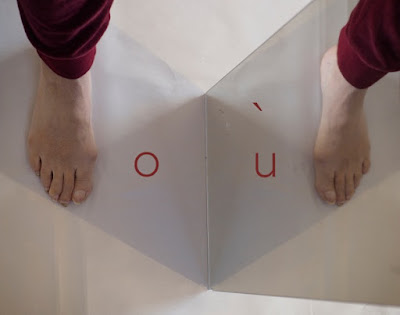open 4 - 19 August, Friday - Sunday 11am-5pm
opening event Saturday 4 August 2-4pm
ROOMSHEET
El Iskandariya – Alexandria(a novel)
Walking a Word is fundamentally a work of drawing, a performative act made with the whole body expanded into everyday life. It is my body walking/drawing the word où on the shared ground of the 5th arrondissment in Paris. The word où refers to the question – ‘where is home’. Three walks spread over three separate days in the same location repeatedly ask the same question as if there might be different answers to be found. Each of the walks takes a particular shape– o, `, u, –shapes that together spell the word ‘where’ in French. The city itself offers (and obstructs) more than one possibility for walking these shapes.
opening event Saturday 4 August 2-4pm
ROOMSHEET
El Iskandariya – Alexandria(a novel)
 |
| Chantal Grech Walking a Word 2018; Photo: P. DeLorenzo |
Walking a Word is fundamentally a work of drawing, a performative act made with the whole body expanded into everyday life. It is my body walking/drawing the word où on the shared ground of the 5th arrondissment in Paris. The word où refers to the question – ‘where is home’. Three walks spread over three separate days in the same location repeatedly ask the same question as if there might be different answers to be found. Each of the walks takes a particular shape– o, `, u, –shapes that together spell the word ‘where’ in French. The city itself offers (and obstructs) more than one possibility for walking these shapes.
In this work the word où is used as a hinge between two modes of being. One a pragmatic reality, the common act of walking in a public space in which we share the ground with others, unknown to us; the other, language, a constructed reality integral to the body, spoken or written on a page.
The first performative act is the act of walking, the second is the act of writing the narrative fragments that grow out of certain moments in the walk, on the wall of the space (another shared ground) during the process of installing.
This project is not unlike a rhizome (a growth mechanism in nature where roots spread horizontally rather than vertically and new shoots arise from nodes formed along the way. The characteristic of the rhizome is that it always has multiple entry points.) The act of walking the question ‘où’ is full of points of intersection, visceral experiences triggered sometimes by totally incidental events. These might be seen as nodes relating to a web of lived moments past and present, all of which exist on one plane and which in this instance give rise to small strands of writing. Past, present, fictional and ‘real’ events are placed here side by side. (Some of the written fragments presented are from a fictional text, also set in the 5th arrondissment of Paris, which takes its roots from ‘real’ situations (WW11, Egypt) in which a woman explores her contested origins.)
As a migrant child growing up in Australia, born in Egypt of Greek and Lebanese parentage whose home language was French, (though no one in the family was French), the search for home and the nature of belonging has been an open question in which the answer has not been fixed. Sometimes it is found in the voice/text of others who have come the same way, at other times it resides in competing places, in habits, sometimes in a borrowed language that floats irrespective of place. This is the subject of the present project, the third of three projects on the question of home and belonging. The first, Points of Departure involved the writing of the novel Alexandria-El Iskandariya set in Egypt and Paris and the reading of written fragments to the empty space of Articulate. The second project, Reading to the River, proposed that home could be found in certain voices/texts of others. It involved a number of performative acts in which passages from a French text (The Curved Planks-Y. Bonnefoy ) in which a mythical child crosses the river in search of home, were read to the river Seine (Paris) and Parramatta Road (Sydney). In this last project the question asked is whether ‘home’ can be found more intimately in language, independent of place. Place then functions as a gathering point, a site of multiple entries and departures.
This work also arises from my experience of visiting Paris in which the first day or so always involves a kind of déjà ‘vu’ (in this case ‘heard’) and a surreal feeling of intimacy with total strangers who speak the language that only my family in Australia spoke to me when growing up. The search now is more pressing as I begin to lose words in French through the death of aging family members though the emotional need for particular and sometimes forgotten words remains strong.
Chantal Grech
